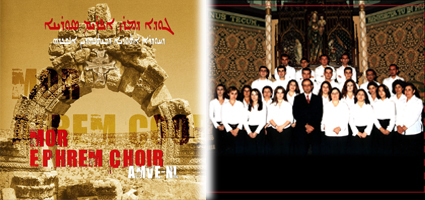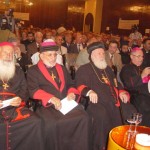
He arrived to Holland in 1999 and established the Mor Ephrem Assyrian Choir in coordination with the directors and members of Beth Nahrin Assyrian Association in 2000. Ever since its creation, this choir has been performing the Syriac Liturgical Hymns in an academic and well-conducted style accompanied by an orchestra. Their goal is to promote this ancient heritage and preserve it in an excellent form. The choir has also participated in many performances in the Churches and the Dutch and Assyrian Theatres.
This is the first recorder work for the Mor Ephrem Choir and it includes the Christmas Liturgy. The choir is also preparing a collection of folk and classical Assyrian songs to record them in a Choral style accompanied by an Oriental orchestra.
Assyrian Music
Many attempts have been made to study Assyrian music, but we are standing before a serious study that has delved into the roots of this music. This study attempts to demonstrate where this music came from, how it was accepted, the reasons why it entered the church, and why changes in music are apparent between the city and village, and between the valley and mountain. It also focuses on its pre-Christian history because when we search for the roots of our melodies, they are to be found in Sumerian, Akkadian, Assyrian, Babylonian and Aramean civilization. It is understandable that such a research would require a thorough archaeological study, but we cannot disregard the fact that some of our tunes used today by the clergy, deacons and choirs are connected to the melodies of Mesopotamia en the pre-Christian era. This is because all the civilizations that have lived on this land cannot have lived without practicing music, for the customs of all nations, music is a cultural art.
The scholar Sawira Sabokht (667 AD) is considered to be the first Assyrian author to research our music. While, the first to bring music into the Assyrian Churches was Mor Ephrem, who had also organized the choirs and composed hymns and prayers in opposition to the heretics. This is what was mentioned by Bar Ebroyo ( Bar-Hebraeus) in the fourth section of the fifth chapter of his Chronicles. Bar Ebroyo also mentions that the reasons fro musical tunes entered liturgy are:
A) The pleasantness of the melody, lessens the pressure of ascetic life.
B) The melody also assists in increasing the understanding of the hidden meanings in spiritual prayers.
The melodic liturgy in our church did not reach its current complete state all at once, but what we see today is rather the result of many years, over six centuries. The Assyrians had used the eight musical octave system, as did the Greeks. The system is based on eight melodies ( Qolo) which also means sound. The word ‘Qolo’ could also be interpreted as a scale of the Beth Gazo collection that is based on a certain genre and the genre is composed of three, four or five continuously ascending or descending musical notes.
Samples:
1. Mor Ephrem Choir – Shlomloch
2. Mor Ephrem Choir – Bater’o diloch
3. Mor Ephrem Choir – Iro men raumo
© Bethnahrin.de
Alle Rechte vorbehalten
Vervielfältigung nur mit unserer ausdrücklichen Genehmigung!


